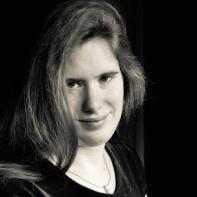
Last year, I had the extraordinary privilege of teaching an undergraduate class on music and poetry. I was thrilled to witness the camaraderie that developed between the musicians, poets, and fiction writers who enrolled as they built our classroom community through workshop and discussion. I watched them collaborate, and watched many genuine friendships form. During the last week, I put together my last planned lesson of the course, a sampling of “how-tos” for the professional writing world – how to publish in undergraduate literary journals, how to write a cover letter, how to find resources and enroll in online poetry classes, etc. Thirty seconds into my presentation, one of my students – let’s call her Viola – said, “but Miss Cole, how do you know when you’re a poet? When do you count?”
This question both deeply resonated with me and also broke my heart. I abandoned my previous lesson plan, reentered the circle of students, and told them that when I was in my second-ever poetry class, I capped off my portfolio with a poem called “When I am a Poet.” The poem itself has been lost, but the general gist was “when I’m a real poet, my work is going to be so much better, I’m going to be so much smarter, and I’ll be taken so much more seriously.”
To be an artist of any kind is to live with the constant, nagging doubt that your art is not legitimate. We believe, instead, that our legitimacy as artists comes from the world around us – from poems and books we have published, to accolades we have won, to degrees we have earned. We believe that these things are concrete and tangible proof that we “count” as artists in our chosen fields.
And it’s not to say that those things don’t matter. They can be helpful to a poet’s career, especially if one wishes to enter academia, where right amount of acclaim and professional connections can sometimes translate into a teaching job. Publication increases our work’s visibility. Awards and grants provide us funding to continue our work. Books allow a poet to showcase a range of work that readers can keep on their bookshelves or bedsides.
But none of these trappings, however useful to someone’s poetry career, make us poets.
Fewer than ten of Emily Dickinson’s poems were ever published during her lifetime, all of them anonymously, possibly without her knowledge, and she is one of the greatest American poets of all time. But even her greatness, her innovation and brilliance is not what made her a poet. Her poetry made her a poet. And that lesson is less about poetry itself, and more about the system that young American poets are brought up in, a system that teaches them to value their work based on publication credits, awards, Facebook likes, and, ultimately, money.
As poets, and all too often as people, we define ourselves by our external accomplishments because the “marketplace” of poetry – of capitalism, of America – teaches us that the value of our artistic work is directly correlated with how many people see that work and thus how much money it makes and/or how famous we become because of it.
Until Viola asked her vulnerable and important question, I was doing all my students a disservice by focusing their attention on publication, rather than teaching them the far more important lesson that their work has intrinsic value all on its own.
So I invoked another metric. “Class,” I asked, “How many of you think that Viola is a poet?”
The class responded with a chorus of affirmation that, yes, Viola was not only a poet, but a talented poet, one with a gift for strange, defamiliarizing syntax and potent, memorable metaphor. “But you’re my friends!” Viola cried.
“Precisely.” I said. “Now, is there anyone else who feels that they aren’t a poet?”
Every hand went up. Including mine.
When they stared at me—but you’re the teacher—I told them that the “marketplace” of poetry would have them believe that they are not a real poet until they’ve collected a certain, often arbitrary, number of accomplishments. I told them that even with dozens of publications in nationally-recognized journals, with a CV full of accolades, a chapbook publication, an MFA, there are days, weeks, whole months, that I don’t feel like a real poet. I told them about poet-friends I know, friends who have books and NEA grants and lists of accomplishments pages long, who still consider themselves to be “emerging” poets, because the poetry marketplace has told that they don’t count as “real poets” yet.
Viola isn’t alone. Every poet I know wonders, at one time or another, at what point they “count.” At what point they will count as “real.” But that’s just the marketplace talking. It’s an easy thing to forget, in the midst of all the other noise, but it’s the poetry that makes the poet. Not the money. Not the brand. Not the number of fans, or of followers on Twitter or Instagram.
Before class ended that day, I asked my students to do one more thing. They looked to their left and their right, and told each other the one truth that I hope they’ve taken away from class, the truth more important than any advice about publication than I could ever give them: You are already a poet, they said to one another. You already count.
